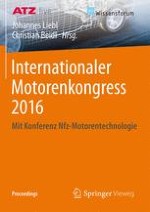2016 | OriginalPaper | Buchkapitel
Future HD vehicle requirements due to legislation and effects on CO2 and air quality
verfasst von : Prof. Dr. Stefan Hausberger, Martin Rexeis, Antonius Kies, Konstantin Weller, Gérard Silberholz
Erschienen in: Internationaler Motorenkongress 2016
Verlag: Springer Fachmedien Wiesbaden
Aktivieren Sie unsere intelligente Suche, um passende Fachinhalte oder Patente zu finden.
Wählen Sie Textabschnitte aus um mit Künstlicher Intelligenz passenden Patente zu finden. powered by
Markieren Sie Textabschnitte, um KI-gestützt weitere passende Inhalte zu finden. powered by
The actual EURO VI regulation based on WHTC, WHSC and on on-board emission tests led to very low emission levels of HDV also in real driving conditions. Consequently the focus of the development will shift more and more towards low CO2 emissions and better fuel efficiency.As important basis for further steps and for neutral information of customers on the fuel efficiency of different trucks, a certification method for CO2 and fuel consumption of trucks is being developed. The method is based on component testing and vehicle simulation using the component test data as model input.Due to the NOx – fuel efficiency trade off a proper monitoring of NOx emissions in the engine test procedure seems to be important to maintain the excellent NOx emission behaviour of HDV in real world driving.The NOx monitoring certainly shall not add unnecessary burden to the engine manufacturers. The best compromise between effort and robustness is still under discussion. The ISC emission test procedure with PEMS equipment covers most of the relevant load points in the actual version. If the threshold for the average engine power of the MAWs in the test is reduced to 10% of the rated engine power, all relevant load points would be covered. Nevertheless relevant shortcomings of monitoring the steady state fuel map by NOx measurement in ISC exist. NOx measurements in real driving conditions would not detect if fuel efficiency optimisations at the expense of increasing NOx are applied to the engine only at the steady state conditions which occur during the engine fuel map measurements and in general (illegal) test engine specific optimisations can also not be monitored by ISC since different physical engines are used.
